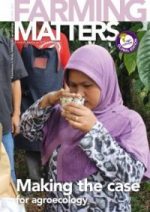Martin Drago provides some ideas on how to move beyond conviction to actions that achieve food sovereignty, suggesting various ways of tracking change.

It is undeniable that the current agro-industrial food system plays a major role in creating and deepening the socioeconomic and environmental crisis facing our planet and its people. It is also clear that solutions will not come from reforming such a system, but from transforming it.However, we are not starting from zero. In many parts of the world, industrial agriculture is not the norm and instead there is a great diversity of small scale farming models based on agroecology. These models generate local knowledge, and promote social, economic, environmental and gender justice, as well as the identity and culture of people.
Agroecology is much more than a scientific discipline. It is a way of life for millions of women and men who prioritise the vitality of their territories over profit. It is also a social movement working towards food sovereignty. Agroecology is synonymous with collective rights and access to common goods. It fosters solidarity between rural and urban peoples, and diversity of knowledge and ways of building knowledge, recognising the crucial role of producers in innovation, research and breeding, as well as the central role of women and youth.
Agroecology builds popular control over food systems and addresses the homogenisation of diets by promoting the use of culturally appropriate local varieties. Moreover, it improves the health of rural workers and consumers by avoiding the use of pesticides. It also promotes the development of alternative institutions and mechanisms to support producers and consumers.
But the challenge is to go beyond these empirical and ideological convictions driving the movement for food sovereignty. We need to show that we are right and expand the social and political support for agroecology. For this purpose, it is essential to demonstrate that its benefits go beyond improved productivity, land use and quality of food, but that they can be the engine of social transformation, redefining power relations in the territories.
This requires a dialogue between different actors with their different ways of knowing. Without scientism, and recognising that agroecology is shaped by people on the ground – indigenous, peasants, women and youth. Producers, workers, consumers, environmentalists, and scientists, among others, must work together to build the evidence that allows us to captivate minds and hearts and make transformative change.
Martin Drago (martin.drago@redes.org.uy) is coordinator of the Food Sovereignty Programme of Friends of the Earth International.


